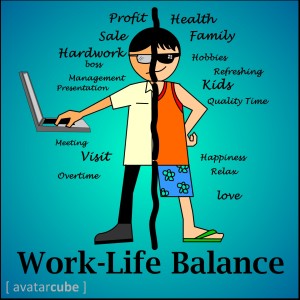Most entrepreneurs know there is no such thing as work/life balance. Work is an integral part of life, not separate from it. So why do so many of us talk about feeling out of balance? Answer: We prioritize work disproportionately over the non-work/rest of our life. And we work in ways that are not sustainable.
We put bounds on almost every aspect of our life, except work. We don’t bring our families to work, but we’ll be heads down in our email during our annual family reunion. We don’t stop in the middle of a work project to take a nap, yet, we’ll truncate sleep to work into the wee hours. We don’t cancel a meeting so we can work out, but we’ll easily cancel a work out to go to work. Why? Possibly because we find work and its rewards addictive.
Reward
At work, most of us are pretty clear about what to do, how we’ll measure it and how our performance will create a beneficial result. (e.g. more customers, lower costs, better employees) We can see a fairly predictable correlation between what we do and the “reward” we get. And that reward keeps us addicted to our work, like rats running through a maze and getting tasty pellets at the end.
In the “rest of life”, expectations, measurements and rewards are less clear. The “do this, get that” relationship is tenuous at best. We could sleep some more, exercise some more, or spend more time with family or friends, but the benefit of that is hard to see, at least at the margins.
Consequence
The consequence of non-performance in work is typically concrete and frequently immediate. If we miss a critical deadline, fumble a major presentation, or forget an important meeting, we will likely feel the consequences quickly. We can skip our work out, miss dinner with our family or friends, forget something on the honey-do list and not experience much consequence (at least not directly and not immediately).
Urgency
Unless someone is bleeding, work almost always feels more urgent that the rest of life. Someone is almost always wanting something specific from us now (or soon). And we know exactly what to do, so doing it is relatively easy. In our non-work relationships (with our spouse, kids, friends), what is being asked of us is often less tangible, less specific, and less time-bound. And in some ways, that makes it harder. The other aspects of our lives that could help us feel more balanced, like exercise, sleep, relaxation, spiritual practice, are rarely ever urgent.
Gradually and Then Suddenly
A quote from the Ernest Hemingway novel, “The Sun Also Rises” sums up well what can happen when we neglect our “rest of life”. “How did you go bankrupt?” “Two ways. Gradually and then suddenly.” We can go from healthy to sick, from chubby to obese, from married to divorced, gradually, and then suddenly. We perceive the consequences of neglecting our non-work lives as negligible until they are insurmountable. So, what do we do?
Work the “Rest of Your Life”
Approach the rest of your life the way you approach your work. Set a vision for your non-work life, including every aspect that is important for you: health, relationships, community, creativity, spirituality. And paint a picture of what you want. And just as you would your customers, ask the key people in your life, what’s most important to them and what they most want from you. Then create plans and activities to achieve your vision, tell the important people in your life about it and follow through with the same discipline that you’d apply to work.
Put the Boundaries Back
Place some boundaries between your work and non-work life. Establish times that are off-limits for work so that you can be present with the people in your life and so that you can unplug and renew yourself. The disconnection from work and the reconnection with yourself and the important people in your life will make space for creativity and ultimate benefit your work productivity.
Resist the temptation to look at email when you first get up. Decide first, what you want for your day and how important that is, before you get hijacked by the email that snuck in during the night. Unplug 30 minutes before bed (truncating work and not sleep). You’ll sleep better and your bed partner will be more available to you. And for goodness sake, keep your work tools (iPhone, iPad, PC, Mac) out of the bedroom. Unless it’s an iVibrate, it’s not a turn on.
Determine Your Non-Negotiables
Determine what you need to prioritize for your “rest of life” to be sustainable and then don’t compromise on it. (e.g. 60 min work outs, 3x week, no matter what, Sunday night call to parents every week, no matter what. At home for dinner with the family by 6:30, 2 x /week, no matter what.) You decide, then tell your friends, family, co-workers so that they can support your commitment to your non-negotiables (and so they feel the tacit permission to do the same).
Working on your life, putting back boundaries and staying true to your non-negotiables will help you create work/life harmony that is sustainable and helps you prioritize all of your life, not just work.





